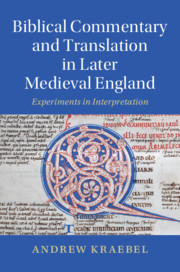Book contents
- Biblical Commentary and Translation in Later Medieval England
- Cambridge Studies in Medieval Literature
- Biblical Commentary and Translation in Later Medieval England
- Copyright page
- Dedication
- Contents
- Figures
- Acknowledgments
- Abbreviations and Conventions
- Introduction
- Chapter 1 Interpretive Theories and Traditions
- Chapter 2 Eclectic Hermeneutics: Biblical Commentary in Wyclif’s Oxford
- Chapter 3 Richard Rolle’s Scholarly Devotion
- Chapter 4 Moral Experiments: Middle English Matthew Commentaries
- Epilogue: John Bale’s Dilemma
- Book part
- Notes
- Bibliography
- Index of Manuscripts
- General Index
- Cambridge Studies in Medieval Literature
Chapter 1 - Interpretive Theories and Traditions
Published online by Cambridge University Press: 22 February 2020
- Biblical Commentary and Translation in Later Medieval England
- Cambridge Studies in Medieval Literature
- Biblical Commentary and Translation in Later Medieval England
- Copyright page
- Dedication
- Contents
- Figures
- Acknowledgments
- Abbreviations and Conventions
- Introduction
- Chapter 1 Interpretive Theories and Traditions
- Chapter 2 Eclectic Hermeneutics: Biblical Commentary in Wyclif’s Oxford
- Chapter 3 Richard Rolle’s Scholarly Devotion
- Chapter 4 Moral Experiments: Middle English Matthew Commentaries
- Epilogue: John Bale’s Dilemma
- Book part
- Notes
- Bibliography
- Index of Manuscripts
- General Index
- Cambridge Studies in Medieval Literature
Summary
This chapter seeks to intervene in recent discussions of scholastic exegetical theory, arguing that general discussions of scholastic hermeneutics (of the sort found in the Summa Theologiae of Thomas Aquinas, for example) must be read against the widely varying and often inconsistent interpretive priorities and approaches that developed, over the course of centuries, in successive commentaries on individual biblical books. The very idea of a general biblical hermeneutic was relatively uncommon (or at least much more constrained) before the scholastic period, and such general scholastic theories only served to create yet more interpretive-theoretical variegation. The intersection – or, rather, the canny deployment – of such competing theoretical claims is exemplified through sustained readings of three commentaries on the Psalter by English exegetes of the 1310s and 1320s, Thomas Waleys, Nicholas Trevet, and Henry Cossey, all three of which remain unedited and, before now, almost entirely unstudied. Cossey in particular emerges as a shrewd critic of recent developments in interpretive theory.
Keywords
- Type
- Chapter
- Information
- Biblical Commentary and Translation in Later Medieval EnglandExperiments in Interpretation, pp. 21 - 53Publisher: Cambridge University PressPrint publication year: 2020

